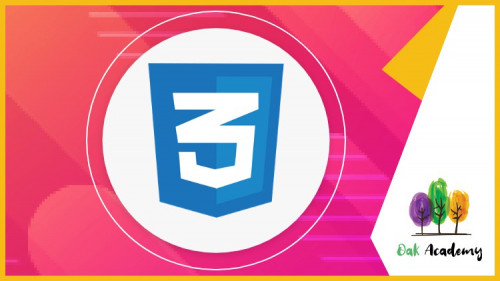
Udemy – CSS For Everyone Learn CSS3 From Scratch
English | Tutorial | Size: 1.01 GB
Learn CSS to build responsive real world websites with CSS3 and become a modern web designer
Css, css for everyone: learn css from scratch, css for everyone, web designer Html, css, html css, html css javascript, sass, html5, web design, html and css, Css, html css, css3
Hello there,
Welcome to the CSS For Everyone: Learn CSS3 From Scratch course.
Learn CSS to build responsive real-world websites with CSS3 and become a modern web designer
This course will be your gateway to learning web design with CSS3 with a step-by-step approach. We can assure you that only this course will be enough for you to learn CSS from scratch to intermediate.
Learning how to code HTML without also learning CSS is like learning how to read but not write. All of your hard web development work is lost if you don’t optimize it for different screen sizes. Udemy has top-rated courses to show you how CSS helps you do just that.
Consider the devices that you use to access the internet on a daily basis. You’ll notice that there isn’t a standard screen size. Without CSS, rendering a website’s text, layout, and design for these discrepancies in screens would be impossible. CSS is the backbone of all website styling work and is rightfully considered a cornerstone of internet technology.
In this course, we will learn CSS in all details.
This course will take you from a beginner to a more experienced level. You will learn CSS3 step by step with hands-on examples.
In this course you will learn;
Course Introduction
CSS Basics
CSS Colors
Background and Border
Selectors
Text and Fonts
Debugging in CSS
Box Model
CSS Position
CSS Float
Display Property
Box -Model Practice
Float-Layout Practice
Box-Sizing
CSS3
CSS Media Queries
CSS Flexbox Properties
CSS Grid
Grid and Flexbox Project
No prior knowledge is needed!
You will learn CSS3 step by step with hands-on examples from scratch
What is Cascading Style Sheets (CSS)?
CSS or Cascading Style Sheets is a style sheet language used to style markup language. Markup languages include HTML, XHML, XML, and other XML-based languages. The most common use of CSS is to style HTML web pages. Although HTML doesn’t need CSS to function, every web page would look the same without it. With CSS, you can target specific elements in a web page and change the look and arrangement on the page. CSS can make an embedded image small or cover the entire webpage as a background. You can enlarge a heading and apply a specific font to stand out from the rest of the page. Other things you can do with CSS include changing the color of elements, making elements float to one side of the page, and the list goes on. Every web page uses HTML, and every web page that has its unique look uses CSS.
What careers use CSS?
CSS applies to any career that involves web development. Web designers create the templates, mockups, and styles for a website using HTML and CSS that web developers use to build websites. Front-end web developers use CSS with HTML and JavaScript to build front-end web applications that run in the browser. Fullstack web developers create both the part of a web application that runs in the browser and on the server and need to know CSS to make the front-end look good. Content managers may need to know CSS to apply custom styles to articles they publish through a content management system like WordPress. Other job titles that may require you to know CSS include junior web developer, social media manager, website editor, content editor, website project manager, website support specialist, and webmaster.
What skills should I have before learning CSS?
Before learning CSS, you should know the basics of using a computer and how to use a text editor because that is where you will be writing CSS. You should also be familiar with web browsers for browsing the web because it will inform your use of CSS. Since you may end up using specialized tools to write CSS, you should know how to install software on your computer and create and manage files and folders on your computer so you can create a CSS project. Once you have those skills down, the next thing to learn is HTML; after all, CSS is nothing without an HTML page to apply styles. That should be the basics you need to know to get started with CSS.
Why would you want to take this course?
Our answer is simple: The quality of teaching.
OAK Academy based in London is an online education company. OAK Academy gives education in the field of IT, Software, Design, development in Turkish, English, Portuguese, Spanish, and a lot of different languages on Udemy platform where it has over 1000 hours of video education lessons. OAK Academy both increase its education series number by publishing new courses, and it makes students aware of all the innovations of already published courses by upgrading.
When you enroll, you will feel the OAK Academy`s seasoned developers’ expertise.
Video and Audio Production Quality
All our videos are created/produced as high-quality video and audio to provide you with the best learning experience.
You will be,
Seeing clearly
Hearing clearly
Moving through the course without distractions
You’ll also get:
Lifetime Access to The Course
Fast & Friendly Support in the Q&A section
Udemy Certificate of Completion Ready for Download
Dive in now CSS For Everyone: Learn CSS3 From Scratch course
We offer full support, answering any questions.
See you in the course!

RAPIDGATOR
rapidgator.net/file/50b85038454d4353525d27fe86d1806e/Udemy_-_CSS_For_Everyone_Learn_CSS3_From_Scratch.part1.rar.html
rapidgator.net/file/ea012a58da5c7ca77fc208378e0e4d07/Udemy_-_CSS_For_Everyone_Learn_CSS3_From_Scratch.part2.rar.html
NITROFLARE
nitroflare.com/view/8DE8D189D3CE25B/Udemy_-_CSS_For_Everyone_Learn_CSS3_From_Scratch.part1.rar
nitroflare.com/view/2A59E5E1439EBDC/Udemy_-_CSS_For_Everyone_Learn_CSS3_From_Scratch.part2.rar